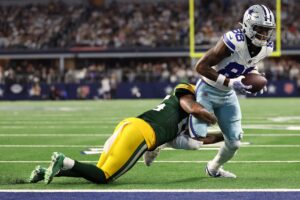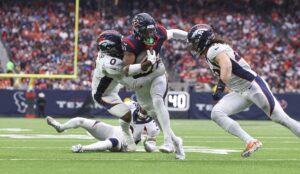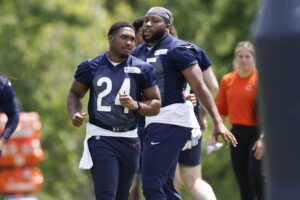The running back position brings to mind memories of Emmitt Smith running wild in Dallas, Marshawn Lynch’s beast quake, and Barry Sanders trying to win tag in a phone booth. Herschel Walker was traded for three first-round picks, three second-round picks, and four players that could have been starters. Now San Francisco traded a second, third, fourth, and fifth-round pick for McCaffrey and there are cries that it was an overpay. What was once heralded as the most important position outside of quarterback, running backs are just no longer important.
Just last week alone, career journeyman D’Onta Foreman and former Day 3 pick Chuba Hubbard combined for 7.5 yards per carry on 24 touches, a day that would be impressive even if Christian McCaffrey was in the backfield. This is far from an outlier performance, as history shows it’s just not smart to pay up for running backs.
Why Running Back is the Least Important Position
This isn’t a death note in terms of talent, or even how important these players are to a team’s identity. Instead, paying up for a running back through draft capital or a contract is a mistake. It’s important to note how much the position is being paid and how effective the replacement at the position is to determine the importance of a position. First let’s look at contracts.
Money Talks
A quick scroll through the 25 largest contracts in the NFL show six wide receivers, four defensive linemen, and fifteen quarterbacks. Top players are paid at every position imaginable in the top 100 other than kicker and punter. Only four of them are running backs: Ezekiel Elliot, Alvin Kamara, Christian McCaffrey, and Dalvin Cook. At one point, this was also the list of the top four running backs in the NFL. The third lowest-paid position is running back. Teams only pay kickers and punters less. If NFL teams are not paying their running backs, being a club that does pay up is a disadvantage.
Besides just looking at the money, PFF does a wins above replacement calculation to show how effective certain players are. If you take T.J. Watt off the field and put in an average player, what does that do to the Steelers defense? McCaffrey at his strongest (2018 to 2019) was worth 0.25 wins above replacement. According to PFF he was on pace for 0.07 wins above replacement this year. He is one of the top running backs in the league and can’t even net a full win over replacement. In contrast, Jimmy Garoppolo is worth 1.39 as the lowest quarterback. Garoppolo also makes almost $10 million less than McCaffrey.
If a team can find a serviceable replacement for cheap, why pay up for a running back? Long story short, they shouldn’t. For every Dalvin Cook there is an Alexander Mattison in waiting. For every overpaid Ezekiel Elliot there is a Tony Pollard (who might actually be better) that a team can pay less than $1 million a year.
Draft Capital
Overspending isn’t just in contracts. Additionally, teams can overpay in the draft. Previously PFF did a piece for the 2021 draft listing total wins above replacement by position. Evidently, running backs accounted for the second least total wins, ahead of only centers. If the position as a whole is not accounting for wins, why would a team ever spend a first-round pick on one? Just ask the Steelers, Jaguars, Raiders, Chiefs, Seahawks, Patriots, Jaguars again, Panthers and Cowboys how their first-round running backs are working out for them.
Even when a team finds a running back that is a true difference maker, their shelf life makes them a poor investment. The 2015 draft had its share of busts and misses, but had two elite running back prospects in Todd Gurley and Melvin Gordon. Gurley is completely out of the NFL and Gordon is a backup at best just seven years later. In contrast, the other positions are either still in the NFL and solid players (Amari Cooper, Marcus Peters, Stefon Diggs) or were a bust from the start (Kevin White). The longevity just isn’t there for a team to commit first-round draft capital to a player.
There are draft gems at every position each year. Hunter Renfrow looked like a mailman and had an argument for All-Pro last year. Jason Kelce slid to the sixth round and is now a top-two player at his position. Even some guy named Tom Brady wasn’t drafted too high if Wikipedia is right. But at the running back position, it has never been easier to find value late. Austin Ekeler went undrafted, Aaron Jones went in the fifth round and undrafted James Robinson is splitting carries with a first round player. At the end of the day, there is just too much talent available to worry about getting a guy early.
The Verdict
Running backs don’t matter. Well, for fantasy teams they do. But for NFL franchises making a push to the playoffs, there is no worse position to invest money or draft capital into. Backup running backs are just as talented as the starters, sometimes in Dallas they’re even better. Players like Dameon Pierce and Tyler Allgeier are just the most recent examples of a history of serviceable late-round running backs. The Christian McCaffrey trade was a genius move by the Carolina Panthers, and should age well for them. All of these reasons just go to show why running back is the least important position in football.






